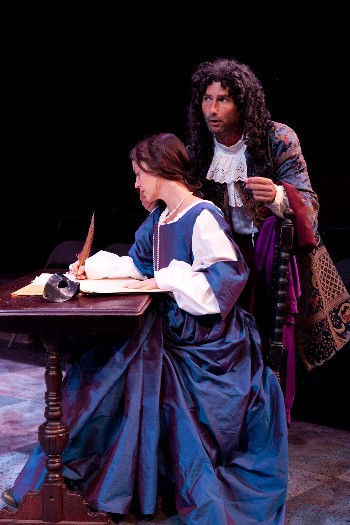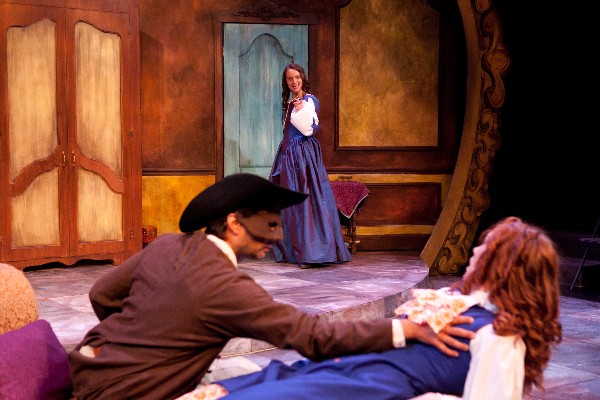Theater Review: The Portrait of a 17th Century Artist as a Young Woman
Liz Duffy Adams’ affectionate look at Aphra Behn’s rise to public prominence, despite prejudice against her gender, comes off as a sort of farcical love letter to an ink-stained ancestor that at times suggests a Shavian talk fest in a minor key.
Or, by Liz Duffy Adams. Directed by Daniel Gidron. Presented by the Lyric Stage Company of Boston, 140 Clarendon Street, Boston, MA, through November 6.
By Bill Marx

Writing Partners in the Lyric Stage production of OR, — Aphra Behn (Stacy Fischer) and Charles II (Ro’ ee Levi)
I have passed up a couple of rare chances to see productions of scripts by Restoration playwright Aphra Behn, including an epic production of The Rover at the Royal Shakespeare Company some years ago. Liz Duff Adams’s charming play about the first woman to make a living as a professional writer—zipped up with impish allusions to sixties counterculture and send-ups of backstage farce—makes me regret the decision, even though critical opinion today generally dismisses her plays as little more than swashbuckling potboilers. As portrayed by the fetching and feisty Stacy Fischer in the pleasing Lyric Stage Company production, the poet, playwright, and novelist (Oroonoko) becomes a heroine of human liberation, a confectionery mix of bawdy free spirit and resourceful freelancing.
It must have been partly that mix of gritty determination and proto-feminist risk that attracted Adams to Behn. Or, isn’t a quasi-historical meditation play in the Tom Stoppardian mode, where ideas-in-tension are dramatized through wit, intricate contrivance, and ironic conflict. Adams has written a sort of farcical/fanciful love letter to an ink-stained ancestor, an affectionate look at Behn’s rise to public prominence despite the prejudices against her gender. At times the play suggests a Shavian talk fest in a minor key—mutually admiring characters settle in, converse, flirt, plot, state their ambitions, and exchange views on sexuality, acting, politics, smoking weed, etc.
This makes for a genially enjoyable romp, to the point that you wish Adams had decided to provide substantial dramatic conflict—only in the latter section of the play does a figure (by the name of William) pop up that complicates Behn’s march toward penning her first script for a major theater company, but that grimy shadow from the past, which supposedly reflects the dank siren call of the spy game, is too trumped up too late.

Virginia Woolf wrote of Behn that “All women together, ought to let flowers fall upon the grave of Aphra Behn… for it was she who earned them the right to speak their minds.”
Or, is so smitten with Behn, and so happy to give her everything that she wants, that the script is content to have men and women blow the plucky heroine giggly kisses. Early on there’s a speech about the chaos and plague besetting London in the late 1660s, but the depression is soon wiped away by high spirits, given that Behn’s (fictional) Deus ex Machina is the King, Charles II. (Every struggling writer dreams of such an omnipotent patron.) The randy, masked monarch visits Behn in prison (she’s an ex-spy overwhelmed by debt), sweeps her off her feet and then into a room of her own, which he visits in disguise for sexual dalliance (but no coitus, because Behn fears becoming pregnant) from time to time. Infamous actress Nell Gwynne, dressed as a man, comes to see Behn, is smitten by her, the king makes a surprise entrance, rumors fly that the Catholics are plotting to assassinate the royal, and the farce is up and running.
The running joke through it all is that Behn, facing a do-or-die deadline, scribbles away at her play, even though the room of her own threatens to turn into a crowded waiting room. Journalists will recognize the quandary.
Besides having fun with Restoration naughtiness (steering clear of its rancid undertones), Adams supplies some nimble satire of the economic demand that playwrights write scripts for small casts. (17th-century drama typically calls for a generous number of performers.) While Fischer supplies Behn with sweet but tough will-to-write, Ro’ee Levi and Hanna Husband tackle three characters a piece. The use of a mask (as sex toy and realpolitik disguise) becomes an amusing joke (who would be more conspicuous than Charles II wearing a mask as he rides through London?), while at one point Adams makes use of a dummy to keep the action moving, if not plausible. Levi strikes me as a zesty Charles II, though sometimes his performance could use more erotic dash—he is frenzied rather than seductive.

Restoration Randiness in Action — Aphra (Stacy Fischer) catches William (Ro’ee Levi) making a move on Nell Gwynne (Hanna Husband) Photo: Mark S. Howard.
Husband brings distinctive comic detail to each figure she plays: Nell Gwynne, Maria, Behn’s loyal servant, and Lady Davenant, a theatrical producer. The actress is particularly winning as Davenant, a self-involved theatrical impresario who talks a blue streak, at one point bursting into a hilarious bête noire against long play titles. She spanks “Mr. Shakespeare” for this, though she doesn’t salute one of the most popular playwrights of the Restoration, Ben Jonson, for keeping his titles short. (Thankfully, Ben will get a chunk of screen time as a dupe of the aristocrats in the upcoming major film Anonymous, a De-Vere-was-Shakespeare-paranoia-fest.) Husband is also mischievously self-conscious as the loyal Maria, a woman who knows just what needs to be done if the show is to go on.
Though the production is a bit placidly directed by Daniel Gidron, Fischer’s charismatic Behn drives it forward, the actress creating an impish creature of beauty, intelligence, and vigor who is always calculating the angles, sexual and finanical, a force of ambitious nature who somehow remains humane. Her performance well serves the play’s fusion of creative potential and sexual pleasure, of a world capable of being made anew, of the need to grasp the inevitable opportunities that arise, whether through luck or pluck. Rose-colored and dramatically thin as Or, may be, its rebuke to today’s formulaic pessimism is part of the fun.
Bill Marx is the editor-in-chief of The Arts Fuse. For over three decades, he has written about arts and culture for print, broadcast, and online. He has regularly reviewed theater for National Public Radio Station WBUR and The Boston Globe. He created and edited WBUR Online Arts, a cultural webzine that in 2004 won an Online Journalism Award for Specialty Journalism. In 2007 he created The Arts Fuse, an online magazine dedicated to covering arts and culture in Boston and throughout New England.
Tagged: Aphra Behn, Liz Duffy Adams, Lyric stage company of boston, Or, Restoration
